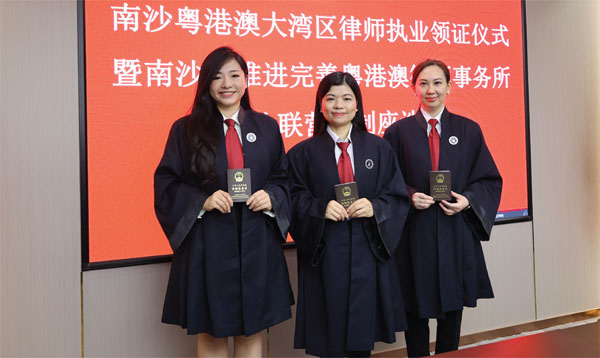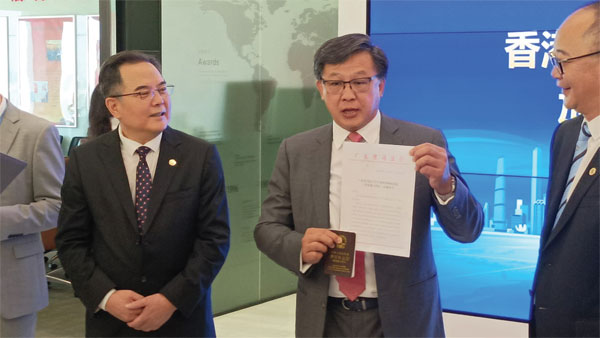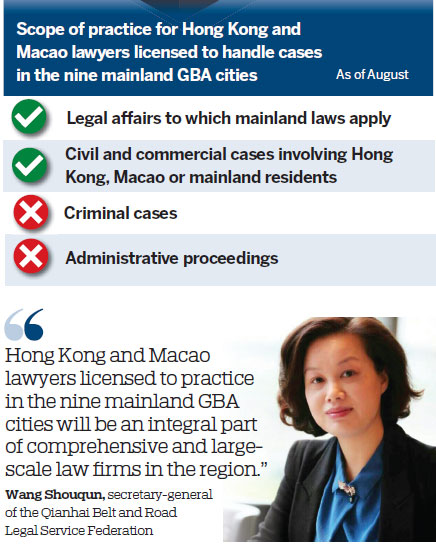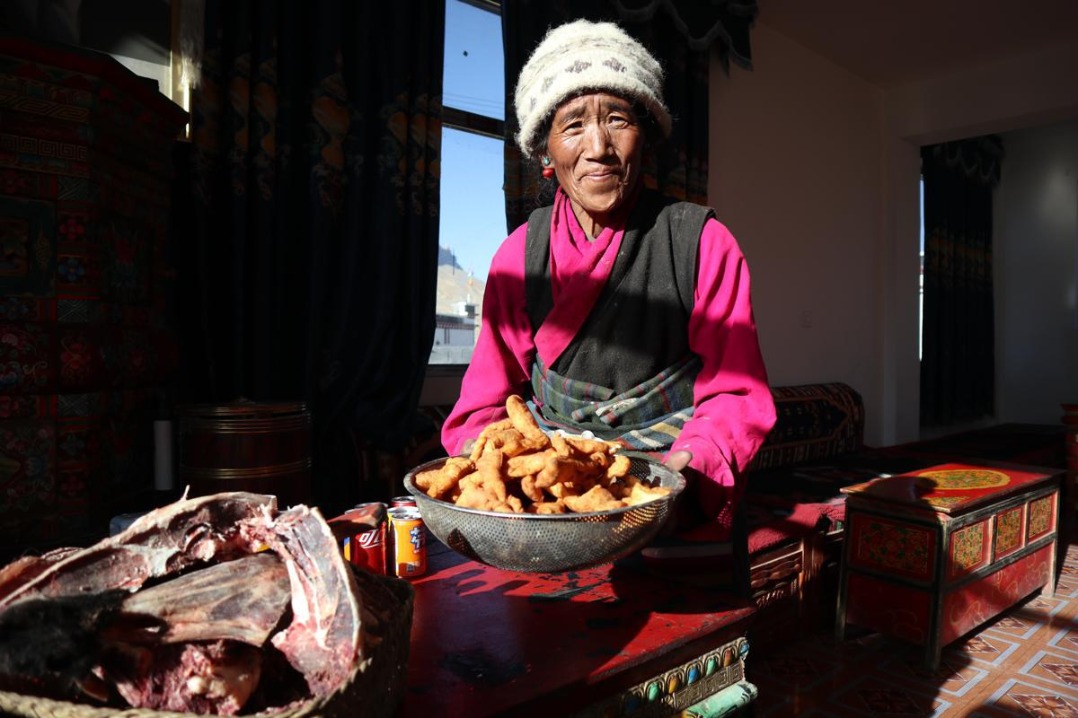'Window' to the bay
Lawyers from the SARs start practicing in the Greater Bay Area's mainland cities, with fresh opportunities in civil and commercial litigation offered under a new policy. Chai Hua reports from Shenzhen.


Lawyers from the SARs start practicing in the Greater Bay Area’s mainland cities, with fresh opportunities in civil and commercial litigation offered under a new policy. Chai Hua reports from Shenzhen.
Gazing at the iconic Canton Tower through the window of his new office in Guangzhou, veteran Hong Kong lawyer and legislator Junius Ho Kwan-yiu donned his lawyer's gown on the Chinese mainland for the first time early last month as he prepared to take on a new job.
Two weeks later, he represented a litigant at a mainland court - another first in his life. The former president of the Law Society of Hong Kong said it was a fresh experience and he felt "excited" and "nervous" although he has been practicing in the professional legal service sector for decades.
The opportunity arises from a license granted to him in July to practice law in the nine mainland cities of the Guangdong-Hong Kong-Macao Greater Bay Area. "Since I obtained the license, we have been approached to handle 10 to 15 legal cases, a very big increase for us," said Ho, who specializes in civil litigation and is the senior partner of a Hong Kong law firm and the principal representative of a law firm in the Guangdong provincial capital.
Licenses to practice law in the nine mainland cities have opened up new opportunities for legal service professionals from the Hong Kong and Macao special administrative regions. But it's just the beginning of profound coordination in cross-border legal rules and mechanisms.
Hong Kong lawyers' advantages in professionalism and internationalism are widely recognized, but industry insiders warn they could face fierce competition.
Wider range
Since 2004, Hong Kong lawyers have been allowed to sit a mainland judicial examination under the Mainland and Hong Kong Closer Economic Partnership Arrangement, but it's an uphill battle for Hong Kong residents due to the vastly different legal systems and languages adopted on both sides.
Even after passing the exam, the business scope for Hong Kong lawyers is limited to nonlitigation legal affairs and civil litigation cases involving Hong Kong and Macao residents. As a result, most of them have to work on the mainland as "legal consultants".
However, a new policy was launched in 2019, allowing eligible legal practitioners from Hong Kong and Macao to practice in the nine Guangdong cities in the Greater Bay Area after taking a special examination.
According to reports by Ta Kung Pao, about 400 lawyers passed the exam last year. But they still have to undergo three months' training, as well as an interview, to get the permit to practice. After obtaining the permit and being offered employment by a law firm in the Greater Bay Area, they will be granted the license.
Hong Kong and Macao lawyers with a license can represent Hong Kong, Macao and mainland residents in nonlitigation, as well as civil and commercial litigation, in the nine cities.
In July, the Department of Justice of Guangdong province granted Ho and three other lawyers from Macao certificates to practice law in these cities - the first group of lawyers from the two SARs to receive such a document. Another 21 Hong Kong and Macao lawyers in Shenzhen were licensed on Aug 19. The provincial justice department also granted such licenses to Hong Kong and Macao lawyers in Zhuhai and Jiangmen, two of the nine Guangdong cities in the Greater Bay Area, on Tuesday.
"ETR Law Firm in Guangzhou had approached me long before. We signed the employment agreement as soon as I received the practice permit," said Ho. "This is neither the beginning nor the end," he said on his first working day at his new Guangzhou office on Aug 2.
Ho's law firm had set up an office in Guangzhou back in 2004, offering consultancy services. He has been traveling between Hong Kong and the mainland since, but had never represented a litigant in a mainland court until last month, together with a mainland lawyer. He said he still needs more time to adapt to and learn the entire litigation process. "It's like I was back to being an intern."
The court's rigorous and humanized processes, such as taking the initiative to investigate the facts of the dispute and inquiring about litigants' willingness to mediate, have left a deep impression on him, he recalled.

Supportive measures
Recognition of their qualifications is just the first step for legal service providers from the two SARs to practice in the nine mainland GBA cities. They still have to overcome various obstacles, including different rules and systems to which they have to adjust when practicing on the mainland.
Mainland judicial authorities and associations have initiated various measures to help the legal practitioners adapt to their new jobs as soon as possible.
Liang Zhen, deputy director of the Department of Justice of Guangdong province, said the department will guarantee Hong Kong and Macao lawyers' practice rights, and establish convenient working and living facilities for them so that they can enter and stay in the cities.
He said the authorities will also set up a platform to help more Hong Kong and Macao lawyers find mainland employers, and facilitate cooperation and communication. "We will further optimize the joint meeting mechanism of legal departments in the Greater Bay Area, deepen cooperation and promote more rules and mechanism coordination," he added.
Shenzhen unveiled a service center on Aug 19, dedicated to providing training and consultation for Hong Kong and Macao lawyers, and recommending them to local law firms. Moreover, licensed Hong Kong and Macao lawyers in the city's Qianhai zone are entitled to a reward of 30 percent of their practicing income on the mainland, with a maximum of 100,000 yuan ($14,513) per person annually.
The justice bureau of Guangzhou's Nansha district will set up an incubating center for Hong Kong and Macao lawyers and continue to promote the development of joint venture firms between the two SARs and the mainland.
In view of the current quarantine arrangements on both sides due to the pandemic, Guangdong courts have held online trials for lawyers and litigants in Hong Kong and Macao. Ho's first court case was held online.
Mainland law firms are also helping Hong Kong and Macao lawyers to better adapt themselves to the legal processes.
"We have assigned assistants to help Hong Kong and Macao lawyers handle documents, arranged senior lawyers to provide professional guidance for them in mainland cases, and help them explore mainland markets," said Li Guowei, a lawyer and deputy director of the public relations department at Kingbridge Sun Kuong Law Firm, which is based in Nansha district and has hired the three licensed Macao lawyers.
"They're not very familiar with the mainland's judicial procedures, including filings, trials and rules of evidence. They also need to gradually adapt to the lawyer management mode and administration of justice," said Li. "After they had been licensed to practice in (the mainland cities of) the Greater Bay Area, several clients from various cities contacted us," he said. The firm's Macao lawyers took on a case on July 16 and are dealing with several lawsuits in the Greater Bay Area's Zhuhai and Zhongshan.

Complementary relations
Although Hong Kong and Macao lawyers have been given the green light to represent mainland clients, their edge is still on international cases for the time being, while their mainland counterparts are more familiar with local regulations and legal systems.
"The GBA license provides us a window to the vast mainland market, while the Hong Kong market is already saturated," said Ho. "Hong Kong lawyers have the advantages in taking up international cases, but this is only a short-term asset as their mainland counterparts are improving very quickly," he said, adding there is competition everywhere, and "we have to keep it up and try our best to gain clients' trust".
Tian Jingjing, the judge in Ho's litigation case, described Hong Kong and Macao lawyers as "professional and international", who can provide high-quality cross-border judicial services.
"Their practice in the Greater Bay Area's mainland cities can give full play to their role as a bridge and promote the connections and integration of legal services between the mainland and the two SARs," Tian said.
Wang Shouqun, secretary-general of the Qianhai Belt and Road Legal Service Federation, believes the relationship between mainland and Hong Kong lawyers shouldn't be one of competition, but partnership that's complementary to each other. "The admission of Hong Kong and Macao lawyers can make mainland law firms more competitive, especially those with international businesses," she said.
In future, she predicts that Hong Kong and Macao lawyers licensed to practice in the nine mainland GBA cities will be an "integral part of comprehensive and large-scale law firms" in the region.
Xiao Shengfang, chairman of the Guangdong Lawyers Association, said the Greater Bay Area is one of the regions that is most economically active, with the highest degree of opening-up. "It entails abundant cross-border disputes, and professionals familiar with the laws of the mainland, Hong Kong, Macao and international economies are urgently needed."
More breakthroughs await
Besides qualification recognition, Hong Kong jurors, arbitrators, mediators and even laws are also allowed in some judicial processes in the nine mainland cities. More than 300 members of the panel of arbitrators in Guangdong are from Hong Kong, according to the Department of Justice of the province.
The Shenzhen Qianhai Cooperation Zone People's Court began adopting Hong Kong laws in 2015 and had heard 96 cases applying Hong Kong laws by April - ranking the first in quantity among grassroots courts in the country - according to a white paper released by the court in May.
By the end of last month, the Qianhai court had accepted more than 10,000 Hong Kong and Macao-related commercial cases. In August, it applied Hong Kong law in judicial confirmations for the first time to help litigants solve their disputes quickly and efficiently.
Measures have also been taken to simplify the legal recognition process concerning the eligibility of Hong Kong and Macao company litigants this year. Litigants can submit relevant information on the official websites of the Hong Kong and Macao SAR governments for filing so that they don't have to prepare cross-border notarization.
Moreover, Hong Kong and Macao litigants are no longer required to attend the Qianhai court in person for authorization. Judges are allowed to witness the authorization remotely through a video link.
Ho suggested that Hong Kong regulations and rules should be revised to coordinate with the increasingly frequent cross-border legal activities in the Greater Bay Area. For instance, Hong Kong lawyers in Guangdong currently have to return to Hong Kong to make declarations for clients. He said it would be more convenient if such remote cross-border witnesses could be accepted in Hong Kong.

- Tianmen grand bridge under construction in Guizhou
- International mayors attend ice and snow expo in Harbin
- Trumpet trees blanket district in Xiamen with purple blossoms
- International mayors gather in Harbin to explore ice and snow economy
- Understand China in the new era: What Chinese modernization means for the world
- In pics: skyline in morning glow in Beijing





































